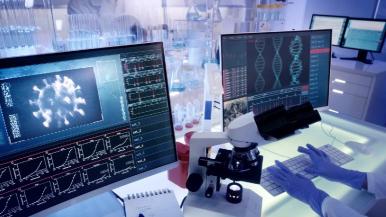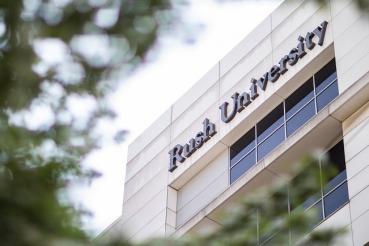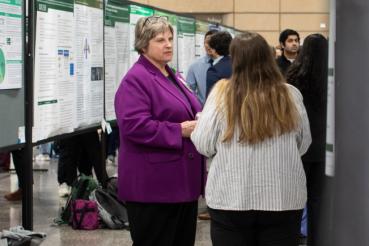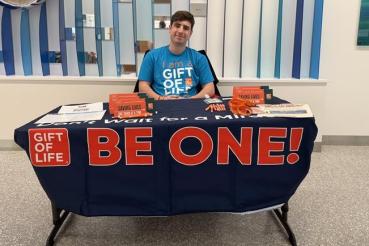The competition is fierce for that first job out of grad school. The Graduate College at Rush University is making sure its master's and doctoral students acquire skills that will make them more marketable for good jobs in the 21st century.
Experiential learning is required for students in the college’s Integrated Biomedical Sciences PhD program and Biotechnology master’s program to give them experiential training and get them thinking about how they might apply the skills they have learned in school. Students in other Graduate School programs can participate if their research advisers and program directors approve their request.
“What makes our program innovative is that experiential learning is a requirement, not a strong suggestion,” says Marenda Wilson-Pham, PhD, associate dean of the Graduate College, who heads up the experiential learning program.
Long-term employment prospects are good for biomedical graduate students, with only 2 to 4% of science and tech PhDs enduring unemployment, even in economic downturns. However, about one in four do not have a job offer in hand when they graduate, according to the National Science Foundation's (NSF) 2019 Survey of Earned Doctorates. And of new PhDs in the life sciences who do have definite job commitments, only 36% reported that their principal employment would be in academia (not including postdocs), according to that 2019 NSF report.
Overall, the private sector now employs about the same number of science PhDs as universities employ.
More intentional postdocs
PhD students often jump into postdoctoral training after graduation to “try to figure it out,” Wilson-Pham says. However, postdoctoral training can actually bring down job earnings during the first 15 years out of graduate school by as much as 20%, according to a 2017 study in Nature Biotechnology.
“We want to be sure that people doing postdocs really want to do them,” Wilson-Pham says.
The Rush experiential learning program includes PhD students who want to stay in academia. Those candidates can opt for positions that teach skills that will make them more valuable researchers, Wilson-Pham says.
As for Biotechnology master’s students, “exposure is the goal,” she says — to career paths, technologies and skills they may not have thought about before.
“Our goal is to give students not only hard skills they learn at the bench but also soft skills they can apply to solve problems in any area,” Wilson-Pham says.
Diptaman Chatterjee, a PhD student in the Integrated Biomedical Sciences program, has specialized in neuroscience and is mulling postdoctoral training, but he's glad he had a chance “to delve into the world of venture creation” in his Technology Diligence Internship with SmartHealth Catalyzer in North Chicago, Illinois. (Experiential learning this past year was virtual due to the COVID-19 pandemic.)
“My passion has been the translational arm of science,” Chatterjee says, and his internship gave him insights into how ideas born in a research lab become products or procedures that help patients in the clinic.
Shaping career choices
Chatterjee stayed on with SmartHealth for a while after his initial internship, eventually as a senior consultant to other interns, and says he could see himself working with the company, or a similar venture, perhaps as a consultant.
Integrated Biomedical Sciences doctoral students Natasha Ferguson and Christina Nowicki got new career ideas from their Cancer Research and Communication experiential learning assignment with Cancer Research Bridge Scientific Consulting, which develops ways to increase cancer education and connect cancer patients with treatment options.
After the experience, Nowicki is now considering science writing for a career. She is planning postdoctoral training but says, “I don't think academia is really the spot for me, so I've decided to start looking at other options.”
Ferguson, a former teacher, also likes the idea of science writing. She is interested in a career with more flexibility now that she’s a mother. “I'd like to find something where I take the big science and break it down,” Ferguson says.
Biotechnology student Yeemon Han went into her Cancer Research and Communication experience with a different perspective. “I wanted to learn how to bring science to business,” she says. Han has a strong science background but has decided to pursue consulting as a career. While her experiential learning position involved science communication, “it still helped me think about how to approach clients and how to put together a project for a client,” she says.
Learning from mentoring
Several students graduating this year are hoping that professional school is in their future. Some are applying to medical school. But Biotechnology student Keina Suggs — whose Education, Leadership and Community Outreach experiential learning position was with Girls 4 Science, or G4S, a nonprofit that encourages middle school and high school girls to consider careers in science and technology — is pivoting away from a science career to law school.
Suggs appreciated that the program gave participants the freedom to not only choose what experiences to be part of but also shape the activities. Suggs says her experience with G4S was so rewarding that she will continue working with the group. “I’m thankful for this opportunity. I don’t know how I would have come across something like this if not for the experiential learning assignment,” she says.
Ashorina Houma, a biotechnology student who plans to go to medical school, also did her experiential learning with G4S. Houma, a first-generation Syrian American, says she could relate to the girls she was helping who had no idea how to go about putting their talents to work. She herself was studying to be a nurse until a mentor suggested an alternative route.
“I have a passion for science and medicine that goes beyond grades and MCAT scores,” Houma says. That includes a desire to help people that made her a good fit for the G4S program.
A virtual environment
Biotechnology students Adedayo Ogundipe and Nickan Azarafrooz are both applying to medical school as well. They believe their AR/VR (augmented and virtual reality) Prototypes in Healthcare or Biomedical Research internship experience will prove valuable if they become doctors, or if they pursue other careers.
“There’s a lot of potential in the models and views that virtual reality can create,” says Ogundipe, who created a virtual tour of the Rush Fitness Center as part of his experience. “You can create a model of the inside of the body and look around in there. It would be really good for teaching.”
Azarafrooz has a strong interest in business development as well as well as medicine. He helped found an events management company after undergraduate school. He also loves technology. Azarafrooz says if he decides to pursue a career in science-related business, he would definitely consider AV/VR. “There are so many ways to implement it,” he says.
‘Opened my eyes’
The Innovation and Technology Transfer (I&TT) experiential learning experience gave participants a chance to assess technologies and whether they are suitable to be patented. For Jack Rubertus, a Biotechnology student who will soon apply to medical school, the I&TT experience was his first internship.
Rubertus will start a job this spring helping hospitals and physician practices adopt electronic health record systems. “Getting involved in biotechnology opened my eyes to the consulting world,” he says. “There’s a lot you can do.”
Biotechnology student Denis Ovoshchnikov plans to enter the biotechnology field either as an analyst or a consultant. The I&TT experience “will make it easier for me to get a job in the future,” he says.
“This program gives you a broad knowledge of technology transfer principles to enhance the master's degree,” Ovoshchnikov says. “In itself, that is so important to getting a start in a meaningful career in science.”
‘You can impact lives’
Varun Swaminarayan, a Biotechnology student from India, participated in both the Cancer Research and Communication experience and the I&TT program.
Swaminarayan has taken on leadership roles in his workplaces, including his experiential learning positions, with an eye on either being a physician or getting into health care management. “I like the idea that you can impact lives, change the outcome of a certain disease and change the course of a person's life for the better,” Swaminarayan says.




